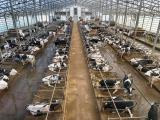Nov 15, 2007 (CIDRAP News) – Veterinary officials in England today said they suspected H5N1 avian influenza at another poultry farm, as authorities in Saudi Arabia stamped out a large poultry flock following confirmation of the virus at a farm near the nation's capital.
Samples from the potentially affected British farm, in Suffolk, were sent for laboratory testing, the United Kingdom Department for Environment, Food, and Rural Affairs (DEFRA) said in a statement today.
The farm is within a restricted zone surrounding the site of a recently confirmed H5N1 outbreak at a turkey farm near Diss, Suffolk. It is among four nearby farms cited yesterday by DEFRA as targets for precautionary culling. All the farms—including the outbreak site near Diss—are operated by Redgrave Poultry, and authorities say workers, veterinarians, or vehicles could have spread the H5N1 virus between them, the London Telegraph reported today.
Authorities suspected the H5N1 virus at the second farm when they arrived to carry out the preventive culling and found that a number of birds were already dead, according to the Telegraph report.
DEFRA said surveillance of poultry operations was under way and that it had increased monitoring of wild birds in Suffolk and neighboring Norfolk.
Several possible sources cited
According to British media reports, several possible sources of the H5N1 virus are under investigation.
One is that the turkeys could have been exposed to wild birds that were attracted to a pond near the farm. However, Redgrave Poultry, in a statement posted on the Farming UK Web site, said the birds were kept in paddocks outside during the day and had access to housing at night. The company said feed and water are kept indoors to discourage wild-bird feeding. It also said electrified fencing, empty space, and a farm road separate the turkeys on the affected farm from the pond.
Redgrave Poultry also said its turkey chicks and feed come from sources in the UK.
Authorities are also speculating that the ducklings imported from the Netherlands or poultry products imported from other European countries by Gressingham Foods, the parent company of Redgrave Poultry, could also be sources of the H5N1 virus, The Times of London reported today. The strain found at the Diss farm is similar to H5N1 viruses found in Germany and the Czech Republic earlier this year, according to a previous report.
However, Redgrave Poultry denied that the disease could have come from the ducklings, and the Dutch agriculture ministry said only one shipment of ducklings had been sent to the UK, to a site 50 kilometers from the outbreak area, the Telegraph reported.
Gressingham Foods processes and packs imported specialty poultry at a plant less than 750 yards from the confirmed outbreak site near Diss, the Times report said. According to Gressingham's Web site, the firm imports guinea fowl, quail, poussin, smoked chicken, and smoked duck.
Earlier this year, British officials said an H5N1 outbreak at the Bernard Matthews turkey operation in February was probably caused by contaminated turkey meat imported from Hungary, which had an H5N1 outbreak in geese at the time. According to a DEFRA epidemiologic report released a few months after the outbreak, the Bernard Matthews farm adjoined a turkey slaughterhouse and two large processing plants that handled Hungarian turkey meat.
Disease hits Saudi Arabia
In other developments, the agriculture ministry in Saudi Arabia released a statement to the country's media that authorities culled 50,000 birds at a farm near Riyadh after officials confirmed an H5N1 outbreak there, Reuters reported today.
About 1,500 birds are believed to have died of the disease at the farm, located in al-Kharj, about 94 miles south of the capital, Reuters reported. The report did not say what type of poultry was affected.
Saudi Arabia's last reported H5N1 outbreak occurred in March when the virus struck a flock of ostriches at a hobby farm, according to a report from the World Organization for Animal Health (OIE).
Elsewhere, Bangladesh has had five new H5N1 outbreaks since October, according to a report today from the UN Integrated Regional Information Networks (IRIN), part of the UN Office for the Coordination of Humanitarian Affairs.
Since March the country has had 55 outbreaks in 19 of its 64 districts, which has prompted the culling of 250,000 birds, the IRIN report said.
The arrival of migrating waterfowl from Siberia has raised concerns about even more outbreaks in the winter months, A.S.M. Alamgir, a virologist at the country's Institute of Epidemiology, Disease Control and Research, told IRIN.
See also:
Nov 13 CIDRAP News story "British officials confirm H5N1 in turkey outbreak"
OIE reports on Saudi H5N1 outbreak
http://www.oie.int/downld/AVIAN%20INFLUENZA/A2007_AI.php
Nov 15 IRIN report


















